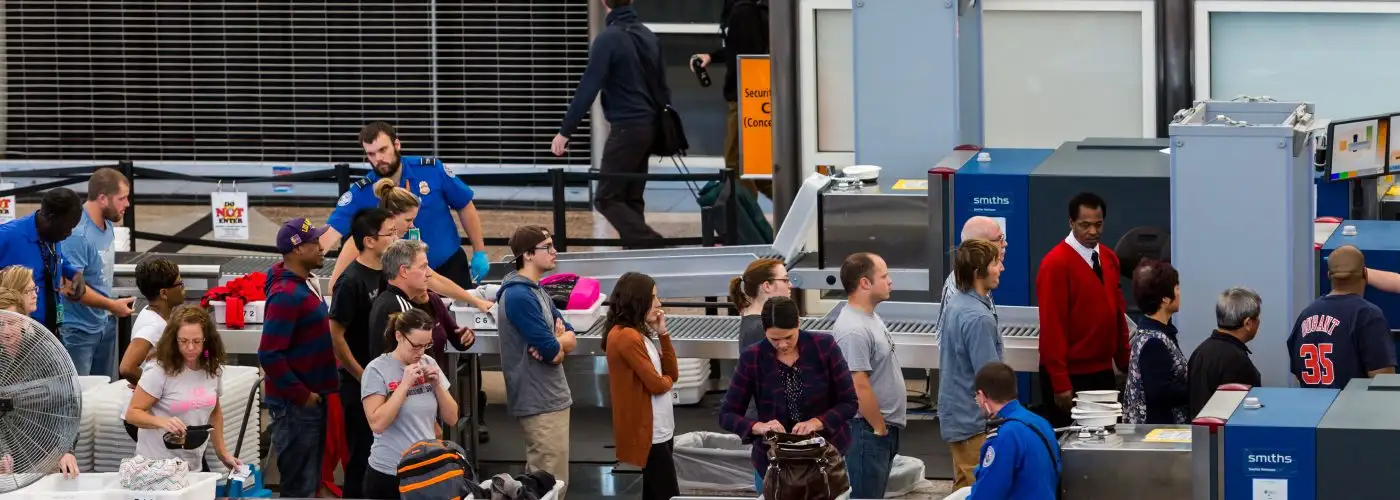Facial recognition is slowly making its way into U.S. airports, with the technology thus far being limited to non-U.S. citizens who are entering or departing the country. But that might be changing soon: The Department of Homeland Security (DHS) says it wants to expand the practice of airport face scans to include U.S. citizens entering and exiting the country, too.
According to TechCrunch, the use of facial recognition has increased in recent years as part of DHS efforts to identify visitors and travelers who overstay their visas. The DHS has a 2021 deadline to implement facial recognition at the country’s 20 largest airports, but faces technological obstacles. Under current rules, U.S. citizens and green card holders are exempt from the practice, but DHS says it seeks to “amend the regulations to provide that all travelers, including U.S. citizens, may be required to be photographed upon entry and/or departure” in order to “facilitate the implementation of a seamless biometric entry-exit system.” Basically, they’re primarily saying it’s just easier to scan everyone.
Biometric Airport Face Scans: The Concerns
But as with prior changes to airport security technologies, airport face scans come with a healthy helping of controversy and privacy concerns.
One big question looming over the technology is rather basic: Exactly how is the government is using it? The ACLU is currently suing the FBI, DEA, and Department of Justice to find out, Vox reports, after the government denied the ACLU’s request for information that would answer that basic question. Vox adds that there is currently “a lot of secrecy” around the issue, and privacy advocates have major concerns over just how far law enforcement will push the technology. Basically, if the government is determined to develop robust database of data by which it can surveil and identify citizens, where does it stop? What are they entitled to use your personal data (in this case your face) for?
Firstly, experts say it’s already being used to investigate crimes despite the fact that facial recognition technology is not necessarily reliable. “Right now, the FBI has access to DMV photos in something like 20 to 30 states,” Jennifer Lynch, the surveillance litigation director at the Electronic Frontier Foundation, told Vox. “I would argue that most of the people in those DMV files have not done anything wrong and yet they are being subjected to criminal searches without their knowledge [or] consent. And that could identify them as criminals or as suspects in a crime, because face recognition technology is not 100 percent accurate.” Lynch also worries about how facial recognition will affect communities that already face excessive surveillance.
Further, she likens these databases to a “search,” in the sense that ordinary, law-abiding citizens will be “searched” when law enforcement is trying to uncover a suspect via facial recognition. “For example,” she tells Vox, “if law enforcement is trying to identify somebody from a photograph … they’re going to search a database to identify who that person is. And that is definitely a search. And it’s something that the Supreme Court has determined to be a search in other contexts.” The Constitution, of course protects citizens from unlawful search and seizure.
Put differently, facial recognition means your face could flash before the eyes of a law enforcement official searching for a suspect in a crime. That fact makes many people uncomfortable, and rightly so, especially given the potential risk that the technology misidentifies you.
Quicker Airport Lines
But hey—facial recognition is pretty quick! (What’s new technology if it doesn’t save you some time at the airport?) Kidding aside, the technology does have the potential to speed up the security process. Time saved per person may be minimal, but overall the technology can smooth out some of the hitches associated with traditional check-in.
In the end, the pros and cons of facial recognition hinge mostly on whether or not it is compulsory. Opting out is likely to be an option for people who do not want the government infringe on their privacy. And for better or worse, it seems like many travelers are fine with the idea—when Delta tested biometric screening last summer, less than two percent of travelers opted out.
“At the end of the day, when the people are in control, the government doesn’t have a right to make decisions about us without our input,” Lynch told Vox, echoing broader privacy concerns. “But it’s hard to have input when you don’t know exactly what the government is planning to do.”
More from SmarterTravel:
We hand-pick everything we recommend and select items through testing and reviews. Some products are sent to us free of charge with no incentive to offer a favorable review. We offer our unbiased opinions and do not accept compensation to review products. All items are in stock and prices are accurate at the time of publication. If you buy something through our links, we may earn a commission.
Related
Top Fares From
Today's Top Travel Deals
Brought to you by ShermansTravel
France: 8-Night Paris, Avignon & Nice...
Infinity Worldwide Vacations
 vacation
$2880+
vacation
$2880+
Poconos: 3 Nts in Garden of...
ResortsAndLodges.com
 hotel
$305+
hotel
$305+
7-Nt Canada & New England Cruise,...
Princess Cruises
 cruise
$839+
cruise
$839+




